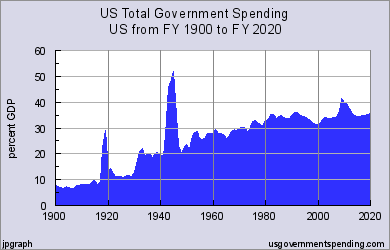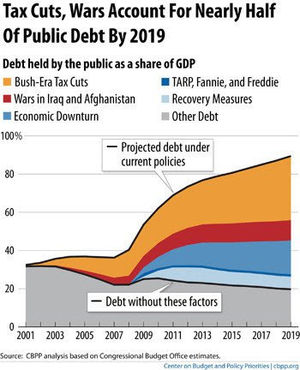Difference between revisions of "Myths/Obama/federal budget"
(graph of gov spending) |
(sources of deficit) |
||
| Line 1: | Line 1: | ||
{{nav/budget crisis}} | {{nav/budget crisis}} | ||
| + | ==Myth== | ||
[[Conservatroll]]s often make the following related claims about the federal budget under the Obama administration: | [[Conservatroll]]s often make the following related claims about the federal budget under the Obama administration: | ||
* spending is out of control | * spending is out of control | ||
| Line 14: | Line 15: | ||
[[File:Usgs chartSp03t.png|right|frame|It's big, but leveling off. Now, if we could just enact some sane budget policies...]] | [[File:Usgs chartSp03t.png|right|frame|It's big, but leveling off. Now, if we could just enact some sane budget policies...]] | ||
Although US spending has arguably been out of control during several recent eras -- most notably the Reagan/Bush and Bush/Cheney years -- these claims have persisted long after the Obama administration reined the deficit back to levels that, although high, are clearly sustainable. | Although US spending has arguably been out of control during several recent eras -- most notably the Reagan/Bush and Bush/Cheney years -- these claims have persisted long after the Obama administration reined the deficit back to levels that, although high, are clearly sustainable. | ||
| + | [[File:247000 148516588550366 100001760784049 281982 1635060 n.jpg|thumb|how we got where we are, and where we're going]] | ||
Most bizarrely, conservatrolls are level these claims at the president who was charged with ''fixing'' the problem, rather than the past president(s) who ''caused'' it. This clearly demonstrates a willful dismissal of reality, qualifying such claims as [[wingnuttery]]. | Most bizarrely, conservatrolls are level these claims at the president who was charged with ''fixing'' the problem, rather than the past president(s) who ''caused'' it. This clearly demonstrates a willful dismissal of reality, qualifying such claims as [[wingnuttery]]. | ||
Revision as of 00:07, 27 December 2015
| Budget Crisis Propaganda |
Myth
Conservatrolls often make the following related claims about the federal budget under the Obama administration:
- spending is out of control
- the deficit is out of control
- Obama has been the cause of vast increases in spending
- The federal debt has increased by almost 70 percent under Obama.
- Obama has accumulated more debt than previous 43 presidents combined
Such claims are almost always being used as justification for one or more of the following:
- cutting spending on existing programs (especially those that help the poor)
- continuing government subsidies for highly profitable companies and sectors (corporate welfare) as necessary for the economy
- a federal balanced budget law (which would be a bad idea)
Reality
Although US spending has arguably been out of control during several recent eras -- most notably the Reagan/Bush and Bush/Cheney years -- these claims have persisted long after the Obama administration reined the deficit back to levels that, although high, are clearly sustainable.
Most bizarrely, conservatrolls are level these claims at the president who was charged with fixing the problem, rather than the past president(s) who caused it. This clearly demonstrates a willful dismissal of reality, qualifying such claims as wingnuttery.
Related Claims
Debunking
In order to understand why current US debt levels are not a cause for alarm, it is necessary to be aware of the following:
- When trying to determine whether debt is excessive or not, the figure to watch is the ratio of debt to GDP.
- In particular, it is a matter of concern if this ratio is high and increasing. If it is going down, and projected to continue to do so, then it's fair to describe the debt as "under control".
- Reducing a deficit too quickly can result in long-term economic downturns, making it much harder to reduce over the long run.
- While the US's ratio is high (70%), it is not extraordinarily so.
- Current laws (as of 2013) are projected to reduce it still further (58%) by 2022.
- As of February 2014, the deficit has already been falling steadily since 2009 -- whether you look at ratio or absolute dollars (although it is expected to worsen for a few years after this due to various factors).
- The austerian prediction that debt levels over 90% of GDP would ultimately lead to economic disaster turned out to be based on a spreadsheet error.
- There is therefore no reason to panic about current deficit levels.
Further, the actions usually recommended by deficit hawks are likely to make debt worse, not better:
- The best way to reduce deficit is to improve the economy.
- Spending cuts which hurt the long-term health of the economy are therefore not just unnecessary but actually harmful -- like eating your seed corn to save money.
- Many of the people now attempting to enhance public concern over debt levels are the same people who spent the Clinton surplus during the Bush years, and who refuse to raise taxes on the rich (which would be helpful both towards reducing the deficit and towards lessening income disparity, itself a serious and growing economic and social problem).
- We should therefore regard such claims with high levels of cynicism, and look for other evidence to determine the truth.
Flies in the Ointment
- Certain types of spending demonstrably are out of control:
- military (but not care for veterans)
- corporate subsidies for certain industries, most notably fossil fuels and big agriculture
Links
Reference
- issuepedia:US/gov/budget/debt/alarmism (includes material used for this article)
News
- 2012-05-22 Obama spending binge never happened: "Although there was a big stimulus bill under Obama, federal spending is rising at the slowest pace since Dwight Eisenhower brought the Korean War to an end in the 1950s."
- 2013-04-29 Treasury to pay down debt for first time since Obama took office: Obama is clearly not making the situation worse. The article specifically cites "unexpectedly higher receipts of government revenue", which can only be due either to (a) an improved economy, (b) a more responsible taxation policy (paying for what we spend), or (c) both.
- 2014-07-20 An Imaginary Budget and Debt Crisis by Paul Krugman: "...debt and deficits have faded from the news. And there’s a good reason for that disappearing act: The whole thing turns out to have been a false alarm."

